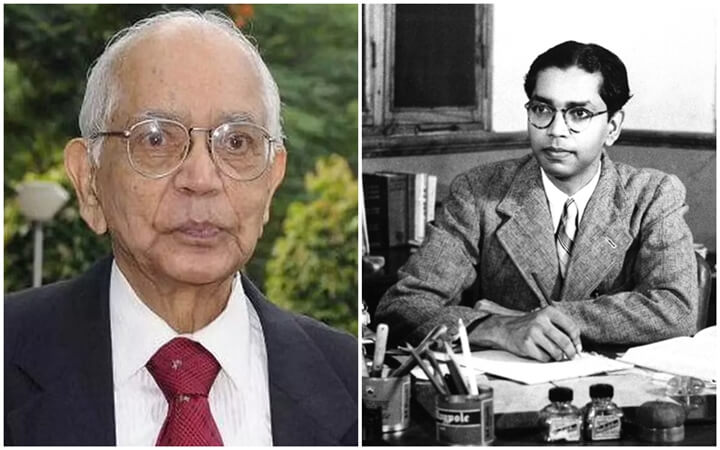Indian American Calyampudi Radhakrishna Rao, who was a living legend in Statistics, departed to heaven before India reached the Moon on August 23. At the age of 102, Dr C R Rao, a mathematician with several feathers in his cap, breathed his last at his residence in Buffalo, New York on August 22.
Unlike today’s Green Card and US citizenship aspirants, Dr C R Rao had served Mother India until his retirement at the age of 60 before he settled in the United States. He was once again in the spotlight of global media as he was awarded the International Prize in Statistics 2023 in July for his monumental work done 75 years ago, which “not only revolutionized statistical thinking in its time but also continues to exert enormous influence on human understanding of science across a wide spectrum of disciplines”, according to the International Prize in Statistics Foundation’s chair.

PC: PTI (left) and Bhavana.org.in (right)
The International Prize in Statistics is the highest honor in the field of Statistics and equivalent to the Nobel Prize. The prize comes with $80,000. The award celebrates the fundamental results that Dr Rao demonstrated in his 1945 paper published in the Bulletin of the Calcutta Mathematical Society. “His three fundamental results – the Cramer-Rao lower bound, the Rao-Blackwell Theorem, and Information Geometry – paved the way for the modern arena of statistics and provided statistical tools heavily used in science today,” said the International Prize in Statistics Foundation.
The Cramer-Rao lower bound is of significant use in signal processing, quantum physics, spectroscopy, multiple image radiography, and likes. The Rao-Blackwell theorem has influenced research on stereology, particle filtering, computational econometrics, and others. Dr Calyampudi Radhakrishna Rao’s Information Geometry has been a great use for recent advancements in artificial intelligence, signal processing, data science, and image segregation. His work in the field of statistics has profound impact on other fields such as economics, biometry, medicine, national planning, genetics, and anthropology.
Dr C. R. Rao, who received the United States’ National Medal of Science in 2002, was born in a Telugu family in Karnataka in 1920. He had stumbled into statistics over his failure to secure military service during the British rule in India. He was among the first five students to have earned a master’s degree in statistics from Calcutta University. When he was barely 5, he could memorize multiplication tables up to 16 by 16, which helped people with everyday monetary transactions in the pre-independence era. He gave credit to his mother for instilling discipline into his life. He wrote in one of his books:
“In my younger days, she woke me up every day at 4 in the morning and lit the oil lamp for me to study in the quiet hours of the morning when the mind is fresh.”
At the age of 102, he was a Professor Emeritus at Pennsylvania State University and a Research Professor at the University of Buffalo, New York. In 2010, he received the India Science Award, the most prestigious honor that the government of India confers in the domain of science. Prior to that, he received the Padma Bhushan in 1968 and the Padma Vibhushan in 2001. In 2013, he had earned nomination for the Noble Peace Prize for his contribution to the International Encyclopaedia of Statistical Science.
The third and the first Indian-origin recipient of the International Award in Statistics, Dr C. R. Rao earned 38 honorary doctoral degrees from universities in as many as 19 countries. He was a member of National Academies in India, the UK, the US, and Italy. He was also the President of the International Statistical Institute headquartered in the Netherlands, and the International Biometric Society headquartered in Washington DC. He was also a Senior Policy and Statistics Advisor for the Indian Heart Association (IHA), a non-profit organization committed to making the South Asian population aware of cardiovascular health.






I am very proud for an Indian to be awarded the Noble Prize in which he excelled from a young age. Education is the best investment in one’s life that parents have made for children to achieve their goals both in their careers and ambitions.
GoI should award him the Bharat Ratna.
Why talented Indians shine after going abroad? Isn’t it because their work is neither recognised nor encouraged by pseudo nationalist govts?
It’s probably because, the country has repeatedly stumbled in creating a system which nurtures, evaluates and recognizes scientific research. It’s also true Prof Rao’s 1945 seminal papers were available to the scientific community world wide, but no one took notice!! So what sense does one get out of this?
Indians are generally intelligent. They have contributed greatly to the advancement of science worldwide. They taught me right from secondary to University and l found them very interesting. Congratulations Prof. Rao. Long life and prosperity, good health and peace Sir.
Hello Dr. Olawuyi! Thank you very much for recognizing Indian talent.